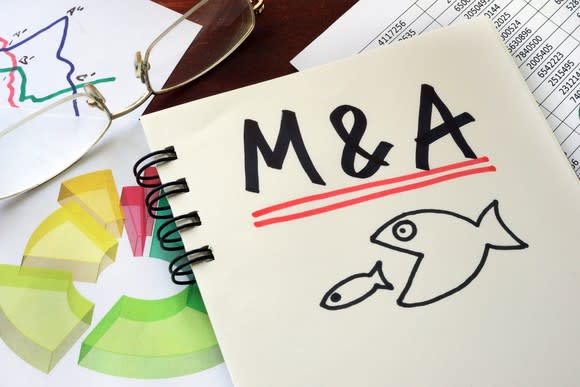Don't Get Too Excited About Pandora's Latest Acquisition
Shares of music streamer Pandora (NYSE: P) staged a small rally last month after the company announced a $145 million deal to acquire AdsWizz. The digital audio ad-tech company, once integrated, will upgrade Pandora's ad tech capabilities and expand its revenue opportunities. The deal triggered a double-upgrade from analysts at Raymond James, who see the company's addressable market growing to as much as $28 billion.
Before Pandora investors get too excited about this acquisition, they should remember that the company's last big foray into deal making was an unmitigated disaster. Pandora's doomed acquisition of Ticketfly in 2015 was supposed to be "a game-changer for Pandora -- and much more importantly -- a game-changer for music," according to then-CEO Brian McAndrews. It wasn't.

Image source: Getty Images.
How to waste hundreds of millions of dollars
Pandora announced its agreement to acquire Ticketfly, a live events technology company that provides ticketing and marketing software to venues and event promoters, in October of 2015. Pandora paid a whopping $450 million, split between cash and stock.
The idea was to use the acquisition to connect Pandora's roughly 80 million monthly active users with events, monetizing its user base in a new way while providing artists and event promoters access to a highly targeted audience.
That doesn't sound all that unreasonable until the price tag is factored in. Pandora paid dearly to enter this market. Ticketing service revenue totaled just $86.6 million in 2016, meaning that the company paid more than five times sales for Ticketfly.
The story ended less than two years later. In June of 2017, Pandora announced that it was selling Ticketfly to Eventbrite. Pandora managed to get $200 million for the business, less than half of what it paid in 2015. This move bolstered its balance sheet and allowed it to refocus on its core business, putting an end to an expensive mistake.
Another expensive acquisition
Pandora has swapped out CEOs twice since the Ticketfly acquisition, so the management team responsible for that debacle is long gone. The deal for AdsWizz is much smaller at just $145 million, but so is Pandora's market capitalization. The company is valued at just $1.25 billion today, compared to well over $4 billion in late 2015.
AdsWizz will do nothing for Pandora's results in the near term. The company said the acquisition doesn't change its guidance for the first quarter of 2018 or its commentary for the full year. The aim is to use AdsWizz to improve Pandora's ability to monetize its user base, a process that will likely play out over the next few years.
The AdsWizz acquisition makes more sense than the Ticketfly acquisition, but that episode demonstrated that banking on an expensive acquisition to turn a company around is a risky strategy. The AdsWizz deal came with more grandiose talk, this time from current CEO Roger Lynch: "With our scale in audio advertising and AdsWizz's tech expertise, we will create the largest digital audio advertising ecosystem, better serving global publishers and advertisers." Given Pandora's acquisition history, I'll believe it when I see it.
Pandora needs to better monetize its user base. The company posted a net loss of $558 million last year, including a $132 million goodwill impairment related to the Ticketfly disaster. Free cash flow was a loss of $226 million.
The AdsWizz acquisition, if all goes according to plan, will make these numbers start to look better in the coming years. But even after a $480 million cash infusion via an investment from SiriusXM last year, cash will start to run low after about two years at the current burn rate. Time is running out for the music streamer to find a business model that actually works.
More From The Motley Fool
Timothy Green has no position in any of the stocks mentioned. The Motley Fool owns shares of and recommends Pandora Media. The Motley Fool has a disclosure policy.

 Yahoo Finance
Yahoo Finance 